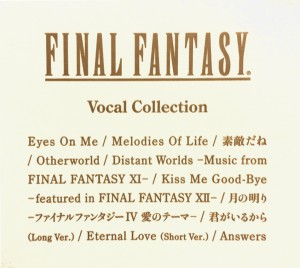Final Fantasy Vocal Collection
 |
Album Title: Final Fantasy Vocal Collection |
| Record Label: Square Enix |
|
| Catalog No.: SQEX-10360 |
|
| Release Date: January 30, 2013 |
|
| Purchase: Buy at CDJapan |
Overview
Final Fantasy Vocal Collection is a compilation album featuring vocal themes from the existing mainline Final Fantasy titles. The collection mostly features themes composed by Nobuo Uematsu, except for two composed by Masashi Hamauzu. There are a variety of vocalists, but most of the songs are slower tracks with similar stylings. There are some great iconic tracks on this album, but it is ultimately hard to shake off the feeling that it was lazily put together as a cash grab without much thought or care.
Body
The first few tracks capture the first vocal themes from the series. “Eyes on Me” from Final Fantasy VIII is the first track, featuring Faye Wong’s pop vocals. She sings softly with restraint, and her English pronunciation is quite good despite a few grammatical oddities in the lyrics. The arrangement is the standard version (as opposed to the “Ending Theme” version), having a standard pop-ballad styling with a light mix of acoustic and orchestral elements. It has a great melody, and its earnestness gives the track a lot of charm. Next, “Melodies of Life” from Final Fantasy IX has Emiko Shiratori’s mature vocal with similar instrumentation. It’s certainly pleasant, though the quality is more noticeably dated and the melody draws too much from Uematsu’s older work. Although there can be some over-sentimentality in these ballads that might turn some listeners off, for those in the mood these songs provide great melodies aided by plenty of emotion.
The standard version of “Suteki da ne” (as opposed to the orchestral version) from Final Fantasy X follows, leaning more on a traditional folk sound. Okinawan singer RIKKI is a perfect fit for the track, and her humble vocal alongside the emotive violin solo make this one of the more notable tracks of the album. “Otherworld” from Final Fantasy X is a big departure on the album, featuring a heavy metal arrangement and Bill Muir’s growling vocals. It’s certainly not for everyone, but it is not a bad track in itself, being well-made within the genre while also having plenty of energy. The biggest problem though is that the track is completely different from everything else on this album, feeling hopelessly out-of-place and needlessly tacked on.
The next tracks return to the slower vocal themes by Uematsu. “Distant Worlds” from Final Fantasy XI is one of the more epic tracks with Izumi Masuda on vocal. She communicates a lot of emotion in her singing, even though her English pronunciation is less than stellar. The lyrics are also quite good, avoiding the schmaltz of the other tracks and focusing on different themes. Strong as the track is, the aged sound quality doesn’t quite do the track justice anymore. As with “Melodies of Life”, it would have benefitted from a re-recording, or at least a remastering. The Final Fantasy XII ending version of “Kiss-Me Good-bye” by Angela Aki brings things back to the more straight-forward love song territory. Strictly speaking, Aki is one of the better vocalists featured on the album, showing with her strength and confidence (and native English pronunciation). I’ll admit I was not a huge fan of the track at the game’s release, but the track has grown immensely over the years.
Masashi Hamauzu’s two vocal tracks performed by Sayura Sugawara from Final Fantasy XIII are present, each having a more modern pop sound with light electronic and acoustic elements. Neither is as dynamic or dramatic as the other album tracks, and the arrangements at times feel a bit generic and unimpressive. Despite this, “Kimi ga Iru Kara” still admittedly has a great melody that allows the track to grow on you, although “Eternal Love” doesn’t quite do as well amongst the other, stronger tracks. “Tsuki no Akari” from the Final Fantasy IV DS release is the most downcast track on the album, being quiet throughout with Megumi Ida’s soft vocals and a more intimate accompaniment. Arranged by Kenichiro Fukui, the melody comes from “Theme of Love”, and overall it’s an excellent track that does the original theme justice and takes the emotion further.
The final track is Uematsu’s “Answers” from Final Fantasy XIV with Susan Calloway. It’s the most varied of the tracks on the album, mixing orchestral and rock elements together in a steady progression from a quiet opening to a dramatic climax. Uematsu’s melodies are still great here, and carry the track through its minor over-indulgences. Calloway is a fine vocalist and performs reasonably well (aside from that switch to falsetto at the apex of the song). It’s a great cap to the album, and is a good demonstration of Uematsu’s evolution over the years.
Summary
Final Fantasy Vocal Collection is a decent compilation of the main Final Fantasy vocal themes. For the most part the melodies are great and catchy, the arrangements are solid, and the vocals are emotive and capable. It is true that some tracks have a bit of over-sentimentality, and they may be hit or miss depending on the listener. Unfortunately the whole pack is put together rather lazily, highlighted by the decision to include “Otherworld” over other prominent vocal tracks from later games. The lack of new material on the album doesn’t help either, and the physical packaging is also nothing noteworthy. If you know what you want from the album and the cost is justifiable to you, then by all means pick up this solid collection of tunes. Otherwise, don’t feel bad about missing out, and just grab anything of interest singly from iTunes.
Do you agree with the review and score? Let us know in the comments below!
3
Posted on May 18, 2015 by Christopher Huynh. Last modified on May 18, 2015.













